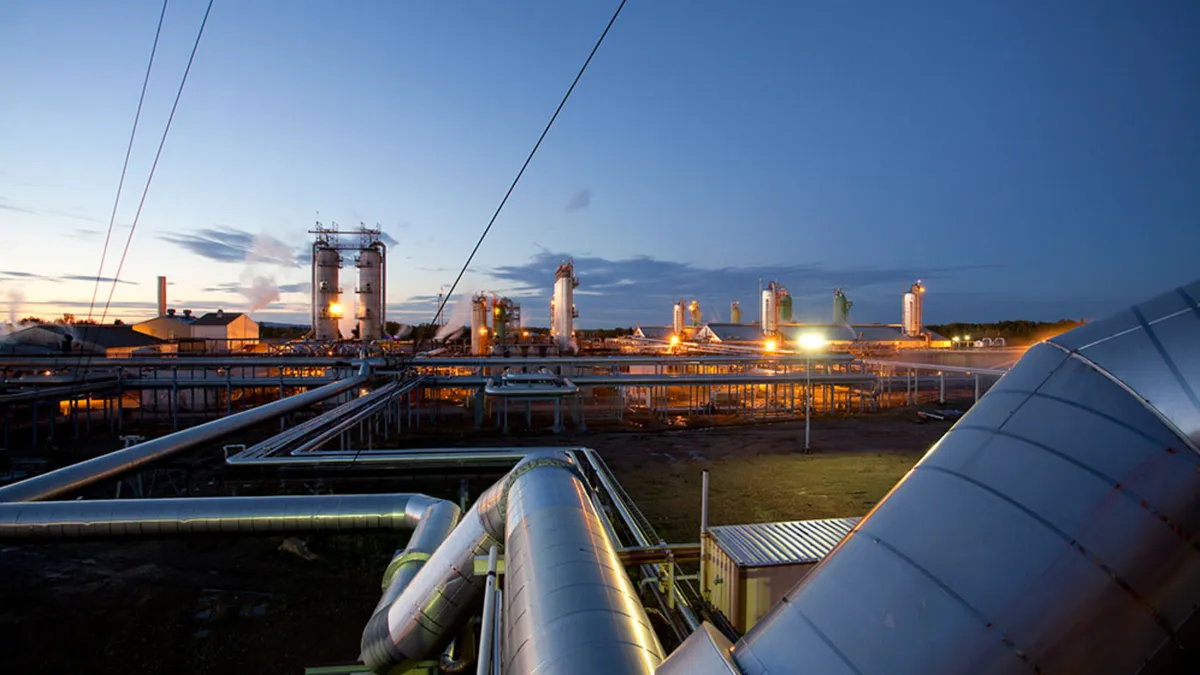Dive Brief:
- The Natural Gas Supply Association (NGSA) announced on Tuesday its support for carbon pricing as part of U.S. efforts to reduce carbon emissions, but did not specify a particular plan or pricing level.
- Among its recommendations for state lawmakers, NGSA said carbon pricing should "replace existing greenhouse gas subsidies and regulations." Other similar industry groups that support carbon pricing have emphasized it should be part of a broader fleet of options for decarbonization.
- NGSA issued a formal stance after seeing patterns of support among its members, some of the largest producers and marketers of natural gas in the country. "Rather than having a state pick winners and losers by doing things like offering direct subsidies of certain fuels ... it would be easier and a more market-driven approach to just put a price on carbon," Dena Wiggins, president and CEO of NGSA told Utility Dive. "And obviously we don't get off scot-free with that approach."
Dive Insight:
The organization believes it's the first fossil fuel industry group to support carbon pricing, a landmark that carbon pricing groups lauded as an important marker for growing momentum among the business community for the market-based approach to carbon reduction.
"It's an encouraging indication that more and more industries are recognizing the need to address climate," Dan Bakal, senior director of electric power at Ceres, told Utility Dive.
NGSA's members had already shown interest in carbon pricing. NGSA member Total had committed to the UN Global Compact's Business Leadership Criteria on Carbon Pricing. BP, Shell, Equinor and Total are also part of the Carbon Pricing Leadership Coalition.
“It’s really interesting to watch the coalition behind carbon pricing expand, and it’s obviously getting attention on Capitol Hill," Ben Evans, vice president of Government Affairs and Communications at the Alliance to Save Energy, said in a statement.
Other major natural gas organizations have not made the same commitment yet. The American Gas Association (AGA), for instance, has not discussed any specific carbon policy with its members.
“In order to continue to reduce greenhouse gas emissions, the U.S. needs a wide variety of options to include deployment of advanced technologies, increased efficiency and could include carbon pricing," Karen Harbert, AGA president and CEO, said in a statement. She emphasized against a "one-size fits all ... [or] a singular prescriptive pathway."
"It’s important that in many cases a carbon price would complement, not replace, regulatory policies that drive energy efficiency such as building codes, appliance standards and fuel economy standards that are some of the best tools we have for helping people reduce their energy demand," Evans said.
The gas companies were already allied with renewable energy advocates against subsidies for baseload power, including nuclear and coal plants.
"To put a price in [for carbon], it's a lot easier for gas organizations... it is a lower carbon fuel, and what I think it indicates is there's more momentum toward really taking action on climate, so they would rather recognize the need to be supportive," Bakal said.
NGSA does not have utility members, which could potentially have other fossil fuel assets that would be threatened by carbon pricing. One such investor-owned utility is Duke Energy:
"We are confident in our ability to continue our solid progress in decarbonization — with an eye toward achieving our goal of net-zero carbon by 2050 — without a price on carbon," Phil Sgro, spokesperson for Duke, told Utility Dive via email.
While momentum is building for carbon pricing, state and federal legislative efforts are not a near term reality, according to many proponents. Washington state failed to approve by ballot a carbon price, but the effort continues to be discussed in Oregon and is central to the Regional Greenhouse Gas Initiative, which is poised to expand.
"This year, we've had eight pieces of [climate] legislation put on the table and a few more are expected to come forward" in Congress, Janet Peace, policy vice president at the Center for Climate and Energy Solutions, told Utility Dive. "I don't really expect any of those to be put into place this year, but they're setting the foundation."
The NGSA announcement is part of that foundation, building support for carbon pricing in the future, Peace said. "Having business associations who are challenged by the policy... I think that's a good indicator that the business community is on board with this idea."
However, as more companies are pledging to support a price on carbon, the more left-leaning Carbon Tax Center warned against crediting a corporate announcement that doesn't have a dollar price per ton of carbon dioxide attached.
"Carbon pricing needs to fairly quickly approach a triple-digit level," Charles Komanoff, director of the Carbon Tax Center, told Utility Dive. Although he acknowledged that can't happen overnight, he said $100/ton of CO2 is meaningful. "Something that's less aggressive than that or less specific than that is in our view 'not really very much.'"
The environmental group League of Conservation Voters (LCV) also cast doubt on NGSA's announcement.
"If the natural gas industry is truly committed to combating the climate crisis, they’ll work with policymakers on the full suite of actions dictated by science," Matthew Davis, LCV's legislative director, said in a statement. "Actions speak louder than words."
While NGSA does not specify a particular plan or carbon pricing levels, it filed comments last month in the New York Public Service Commission's docket on carbon pricing in support of the policy.
"We think this is the right place to start," Wiggins said, regarding the lack of carbon pricing levels in NGSA policy. "We don't have a lot of details about what the right price would be or exactly how this would be implemented."















